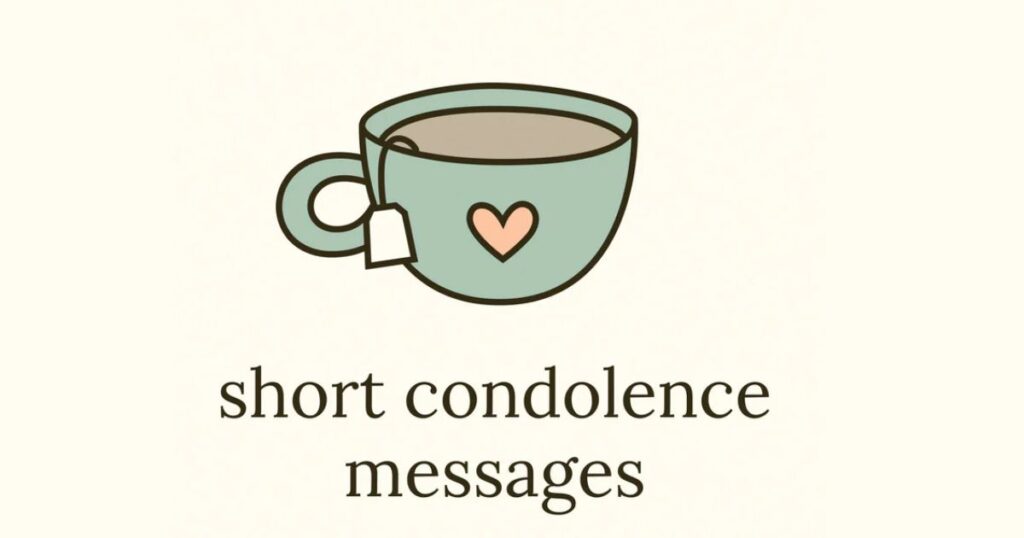Understanding how to offer heartfelt sympathy messages during difficult times requires careful consideration of your relationship with the recipient and their specific circumstances.
This comprehensive guide provides modern condolence quotes and thoughtful messages of support tailored to various situations, ensuring your words provide genuine comfort.
What’s the Purpose of Short Condolence Messages?
Short condolence message to a friend, family member, or colleague serves multiple essential functions in our modern communication landscape. These messages express genuine sympathy while acknowledging the recipient’s pain and demonstrating your availability for support. Modern short condolence messages based on recipient focus on offering comfort and peace through carefully chosen words that respect the grieving process.
The primary purpose encompasses expressing condolences with care, sharing meaningful memories when appropriate, and providing reassurance that the person experiencing loss has a support network. These compassionate words for the grieving aim to bridge emotional distance while respecting boundaries during vulnerable moments.
Short Condolence Messages When Recipient Is Grieving a Loss of One

When someone experiences the death condolence message situations, your words must balance sincerity with brevity. Sudden death condolence message scenarios require particularly sensitive language that acknowledges the shock while providing comfort.
“My thoughts are with you during this incredibly difficult time.”
“Short sympathy messages for death like this acknowledge pain without minimizing the experience: ‘Your loss weighs heavily on my heart.'”
“I am deeply sorry for your profound loss.”
“May cherished memories provide solace in the days ahead.”
“Grieving loss quotes often resonate: ‘Love never truly leaves us.'”
“You have my complete support during this painful journey.”
“Thinking of you with sincere sympathy and care.”
“May peace find you amidst this overwhelming sadness.”
“Mourning message for a friend should feel personal: ‘Your strength inspires me, even now.'”
“I extend my deepest condolences to your entire family.”
“Holding space for your grief with understanding and love.”
“Condolence messages for family loss require gentleness: ‘We share in your sorrow.'”
“Your loved one’s memory will forever remain a blessing.”
“Loss of parent condolences demand special care: ‘May your parent’s love guide you forward.'”
“Sending strength for the difficult days that lie ahead.”
Short, modern condolence messages can be tailored to the recipient for greater impact. For close friends and family, consider messages like “Sending you all my love during this difficult time” or “My heart aches for your loss, I’m here for you.”
For colleagues or acquaintances, a simple “So sorry for your loss” or “Thinking of you and your family” can be appropriate. For messages to someone grieving a parent, consider “My deepest condolences on the loss of your father/mother” or “May you find strength in the love and memories you shared.”
Here are some specific examples, categorized by recipient:
For Friends and Family:
- “Sending you all my love during this difficult time.”
- “My heart aches for your loss, I’m here for you.”
- “Thinking of you and sending strength.”
- “Wishing you peace and comfort as you remember [Name].”
- “I’m so sorry for your loss. Please know I’m thinking of you.”
- “My deepest condolences to you and your family.”
- “Holding you close in my thoughts.”
- “May happy memories bring you comfort.”
- “I’m here if you need anything at all.”
For Colleagues or Acquaintances:
- “So sorry for your loss.”
- “Thinking of you and your family.”
- “Please accept my sincere condolences.”
- “My deepest sympathies.”
- “I’m very sorry to hear about your loss.”
- “Sharing in your sorrow.”
For Someone Grieving a Parent:
- “My deepest condolences on the loss of your father/mother.”
- “May you find strength in the love and memories you shared.”
- “Thinking of you as you remember your [father/mother].”
- “Words cannot express how saddened I am by your loss.”
- “Sending you love and support during this difficult time.”
Short Condolence Messages When Recipient Is Going Through a Divorce
Divorce represents a significant life transition requiring emotional support after breakup through carefully crafted messages. Comforting words for divorce should acknowledge the difficulty while maintaining hope for future happiness.
“You deserve peace and happiness in this new chapter.”
“Healing after separation quotes remind us: ‘Every ending creates space for new beginnings.'”
“I stand with you during this challenging transition period.”
“Supportive messages after divorce focus on strength: ‘Your resilience amazes me.'”
“Take time to heal at your own comfortable pace.”
“You have unwavering support from those who care deeply.”
“Short divorce sympathy quotes offer hope: ‘Brighter days await you ahead.'”
“Your happiness matters, and it will return in time.”
“Words of encouragement post-divorce emphasize growth: ‘You are becoming stronger every day.'”
“I believe in your ability to rebuild and thrive.”
“Sending positive energy for your journey toward healing.”
“You are worthy of love, respect, and genuine happiness.”
“This difficult chapter will lead to better opportunities.”
“Your courage in facing this change inspires others.”
“Remember that asking for help shows wisdom, not weakness.”
Short Condolence Messages When Recipient Is Going Through Health Issues

Health challenges require messages that balance realism with optimism. Get well condolence messages should acknowledge the difficulty while encouraging strength and recovery.
“Supportive words during illness matter: ‘Your strength continues to inspire everyone around you.'”
“Sending healing thoughts and positive energy your direction.”
“Uplifting quotes for the sick provide hope: ‘Each day brings new possibilities for improvement.'”
“You remain in my thoughts throughout this challenging time.”
“Recovery encouragement phrases offer comfort: ‘Take healing one day at a time.'”
“Your determination to overcome this obstacle amazes me.”
“Health crisis support sayings acknowledge struggle: ‘You are braver than you believe.'”
“Wishing you comfort, peace, and steady progress toward wellness.”
“Messages for healing and strength emphasize support: ‘You are not walking this path alone.'”
“May each day bring you closer to complete recovery.”
“Your positive attitude makes a genuine difference in healing.”
“Sending love and encouragement for your continued strength.”
“Trust in your body’s ability to heal and restore.”
“You have countless people supporting your recovery journey.”
“Rest well, heal completely, and know you are cherished.”
Short Condolence Messages When Recipient Is Going Through Job Loss
Employment transitions create financial and emotional stress requiring thoughtful support. Sympathy messages for job loss should acknowledge the difficulty while emphasizing future opportunities.
“Losing a job quotes remind us: ‘Sometimes we need to lose something to find something better.'”
“This setback will ultimately lead to better opportunities ahead.”
“Encouragement after losing job focuses on potential: ‘Your talents will open new doors.'”
“I have complete confidence in your professional abilities.”
“Support for employment transition matters: ‘You will land exactly where you belong.'”
“Take time to explore possibilities you had not considered.”
“Bouncing back from layoff quotes inspire: ‘Resilience transforms challenges into comebacks.'”
“Your skills and experience will lead to success.”
“Messages of hope for career changes emphasize growth: ‘New opportunities often wear disguises.'”
“This transition period allows for reflection and planning.”
“Your next position will appreciate your unique talents.”
“I am here to support you throughout this search.”
“Trust that the right opportunity will present itself soon.”
“Your professional network believes in your capabilities completely.”
“This change will ultimately lead to greater satisfaction.”
Short Condolence Messages When Recipient Is Going Through Loss of Home
Home loss creates profound displacement requiring sensitive acknowledgment of both practical and emotional challenges. Support messages after disaster must balance empathy with encouragement for rebuilding.
“Displaced family condolence quotes acknowledge pain: ‘Home is wherever love resides, and yours travels with you.'”
“Your resilience in facing this loss inspires everyone.”
“Home loss sympathy messages offer hope: ‘New foundations can be built on love and determination.'”
“I am here to help in whatever way proves most useful.”
“Rebuilding hope after loss requires community: ‘You do not face this challenge alone.'”
“Your strength during this crisis shows remarkable character.”
“Emotional support after tragedy emphasizes continuity: ‘Your memories and love remain intact.'”
“This devastating loss will not define your future happiness.”
“Your family’s bond provides the foundation for rebuilding everything.”
“I have complete faith in your ability to overcome this.”
“New opportunities for home and happiness will emerge.”
“Your courage in facing this adversity amazes everyone.”
“This temporary displacement cannot diminish your spirit permanently.”
“Together, we will help you rebuild what was lost.”
“Your story of recovery will inspire others facing similar challenges.”
Sending Condolence Messages Using Technology

Modern communication requires understanding appropriate digital etiquette for virtual condolences across various platforms. Texting sympathy messages demands consideration of timing, privacy, and message length.
Text Message
Condolences text messages provide immediate support through direct communication. Digital empathy etiquette requires careful attention to timing and tone when sending these personal messages.
Direct and immediate communication makes texting ideal for urgent sympathy expressions. Personalize each message to avoid generic language that feels impersonal. Writing e-condolences through text requires sensitivity to timing considerations, as late-night messages may feel inappropriate during grief.
Short and meaningful condolences work best in text format due to character limitations. Include offers of specific support or assistance when appropriate. Respectful online condolences through text messaging requires understanding privacy boundaries and respecting the recipient’s communication preferences during sensitive periods.
Email condolence etiquette allows for more detailed expressions of sympathy while maintaining professional appropriateness. How to express grief via email requires careful attention to subject lines, personalization, and message length.
Choose respectful subject lines that clearly indicate the message purpose. Address recipients by name and personalize messages with appropriate memories or specific thoughts about their situation. Virtual support after loss through email allows for longer, more thoughtful expressions than text messaging permits.
Sincere condolence phrases work well in email format because they allow for elaboration and context. Offer specific assistance when appropriate, and ensure messages remain error-free through careful proofreading. Comforting two-line sympathy quotes can be effective even in longer email formats.
Social Media
Social media sympathy messages require careful consideration of privacy, appropriateness, and audience reach. Respectful mourning messages on public platforms must balance support with privacy considerations.
Consider platform nature and privacy preferences before posting public condolences. Non-religious condolence options work best on diverse social media platforms where audiences may have varying beliefs. Avoid sharing personal details or private information without explicit permission from grieving families.
Secular sympathy message ideas maintain inclusivity across diverse social media audiences. Acknowledge any family requests regarding social media posts or message preferences. Personalized grief messages can be effective when shared privately rather than publicly.
General Tips:
- Keep it short and sincere.
- Offer support without being prescriptive.
- Focus on the deceased’s positive qualities if appropriate.
- Consider adding a specific, fond memory if you have one.
- Avoid offering unsolicited advice.
- Use the recipient’s preferred method of communication.
- Sign off with a warm and caring message.
The most important considerations for modern short condolence messages based on recipient free delivery include timing, authenticity, and mindfulness regarding the recipient’s grieving process. Appropriate condolence expressions require understanding that grief affects everyone differently, and your support should adapt accordingly to provide maximum comfort during difficult transitions.
Short condolence message professional contexts require balancing empathy with workplace appropriateness, while condolence quotes for coworkers should maintain professional boundaries while offering genuine support. Sympathy messages for close friends allow for more personal language and intimate expressions of care.
Understanding condolence etiquette by relationship ensures your messages provide appropriate comfort while respecting boundaries during vulnerable periods. Emotional message wording guide principles emphasize authenticity, brevity, and genuine care over elaborate language or complex expressions that may feel overwhelming during grief.
How to comfort someone in pain through written messages requires understanding that sometimes the most powerful support comes through simple acknowledgment of their loss and consistent availability for future assistance when they feel ready to accept help.

Hello, I’m Daisy Sadie, a writer at Azaadpuns. I explore the dynamic world of puns and wordplay, delivering captivating linguistic twists that will make you laugh and groan. Join me on Azaadpuns.com for the latest in clever wordplay that makes language fun again.

